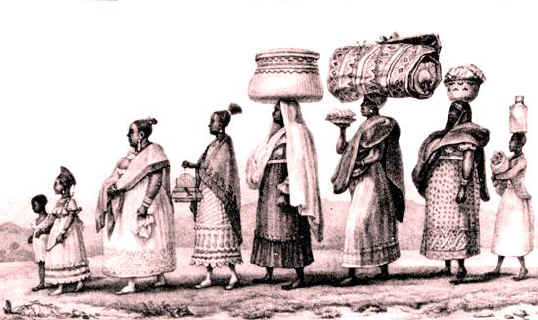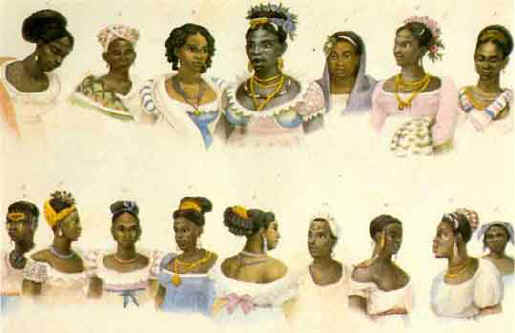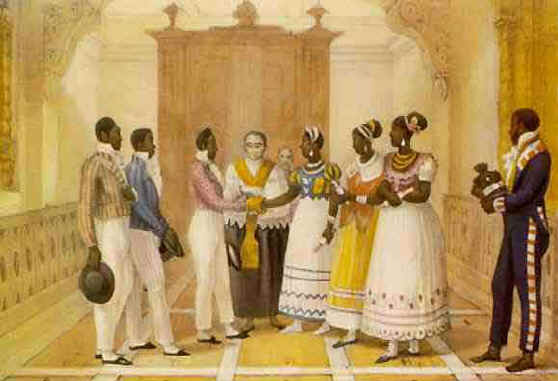
Color, Class, and Descendancy in Brazil

Mulata a caminho do sítio para as festas de Natal/ Mulattas on the way to the Christmas Feast
by Jean Baptiste Debret
Whenever Brazil is mentioned in the U.S. by my friends, my anthropology students, in the press and popular literature, and in academic studies of "race", there are confusing and conflicting statements and theories about Brazil and Brazilians.
Few outsiders have a real sense of what a Brazilian is or isn't, but it is clear that the US government has already made up its mind about Brazil as a dangerously large populace in South America who aren't "white" enough for comfort, no matter what Brazilians call themselves. Hence the difficulty Brazilians have had getting US visas - even to visit as tourists.
Is there racism in Brazil - yes. Can we analyze it through a US lens - No.
I will be writing about this issue academically, over the next few years, but will briefly and anecdotally share some observations.
I am black. I am of African descent. I was born a Negro in 1947 in the US, was called "colored", fought as an activist, became "black", had that shift to Afro-American, and today the term is African-American.
Do I have European (so-called "white") ancestry also. Yes. So do most of the folks I know in the US who are "black". Black is not a skin color here - since we range from ecru beige to eggplant with most somewhere in between - it is an identity. We were forced into this racial box by virtue of enslavement, and are kept in it by virtue of institutionalized racism. We maintain our identity and culture - both with pride and as a defense. Though race may be a social construct genetically - there is no question about us being part of a specific black American culture, and sub-cultures.

painting by Jean-Baptiste Debret
Cut to Brazil. As I walked down the street in Rio and in the little town of Cachoeiras de Macacu I marveled at the number of black folks I saw - though intellectually I've done a lot of research and reading about Brazil, the actual experience played out differently. Walking with me was my friend Maria, who is also an anthropologist by training. Since she also lived in the United States for so many years she is able to switch "racial gears" so to speak, and she asked me what I thought was a harmless and idle question. She asked that I point out people who in the States would be automatically classed as African-American.
As we walked along I indicated person after person, a few I selected as being what I would call "white" in the US, and others would fall into some vague category the US frames as "Latino" or "Hispanic looking" - but the majority of average people I saw, could easily "pass for black" in the US. I wasn't in a rich upper class area - neither was I in a favela/shanty town.
Maria smiled a Mona Lisa-ish smile and as I pointed out person after person she shook her head....answering ..no, no, no - they are white. A few she acknowledged as black.
Puzzled - I said, ''impossible". The only people she selected as black were far darker in complexion than most African-Americans. The others were "white", she said. A few I had selected were "caboclo" (mixed indigenous ancestry) she added. These were the ones I had put into my fuzzy Latino category.
She suggested I erase my preconceptions about race - since it is a social construct, and look only at skin color - as a descriptive, adding slyly that I was white too. I was shocked. Not me!!!
This was impossible for me to accept - I've spent my whole life being black - and wasn't about to accept that designation.
I then made a point of introducing myself to people we met as a Black American. They were quite puzzled - and a few ventured to correct me.
All of the people who I was told by Maria were white - and a few she designated as "white white" since they had blue or green eyes, or blondish or sandy hair, were also people who when discussing their families - ALL had an African grandparent or great grandparent. All stated simply that so and so in their family had been a slave.
And this was recent - not ancient history. Maria informed me that the last former slave died in Brazil in 2001. I knew that slavery in Brazil was the last to end in the New World - but never thought about it in generational terms. Most people my age (I'm 59) actually knew former slaves. Many were their relatives.
Brazil embarked up a "whitenization" program in the late 1800's, right after the emancipation of the slaves in 1888. They encouraged migration from Europe, more than likely frightened of the huge mass of Africans who were the overwhelming majority of the population.
Differing from the US - Brazil did not define "blackness" the same way the US did - but the historical circumstances were different. Never were blacks the majority in the US. The social construction of "white" and "black" in the US, which included "mulattos" in the black category - was enforced through the one drop rule - one drop of "African blood" made you "black".
Brazil on the other hand had to manufacture "whiteness", not only by importing it - but by home-growing lighter-skinned citizens.

wedding painting by Jean-Baptiste Debret
This brings us up to the present - as a consequence of the historical construction of race - to be "black" in Brazil does not have the same meaning as it does in the US. Two-thirds of the people I saw on the streets of Brazil who would be considered African-American in the States are "white". And once I got to talk with those same "white" people, even those described as "white-white" (blue or green eyes) - all mentioned that ancestor who was black. This would automatically make a person black in the US - never would this be a statement of pride- except for a person already accepting of their ancestry and from the black community.
Are many poor Brazilians dark? Yes. Are many lighter Brazilians poor? Yes, again.
Is the culture of Brazil we see, hear, taste, experience African in origin? Yes. Even the renowned beauty of Brazil's women is based on an African standard - not breasts but "bunda" (derriere) which is a Bantu genetic inheritance of even the fairest skinned Brazilian women.
I realize that this subject is too complicated to discuss in full here - but all I can say as a Black American is that never have I felt so comfortable in a country outside of Africa - and actually more comfortable than I felt in some African nations that are either heavily Christianized (not socialist) or Islamic.
Next: Bar-be-que "churrasco" at Babalorisha Leo's